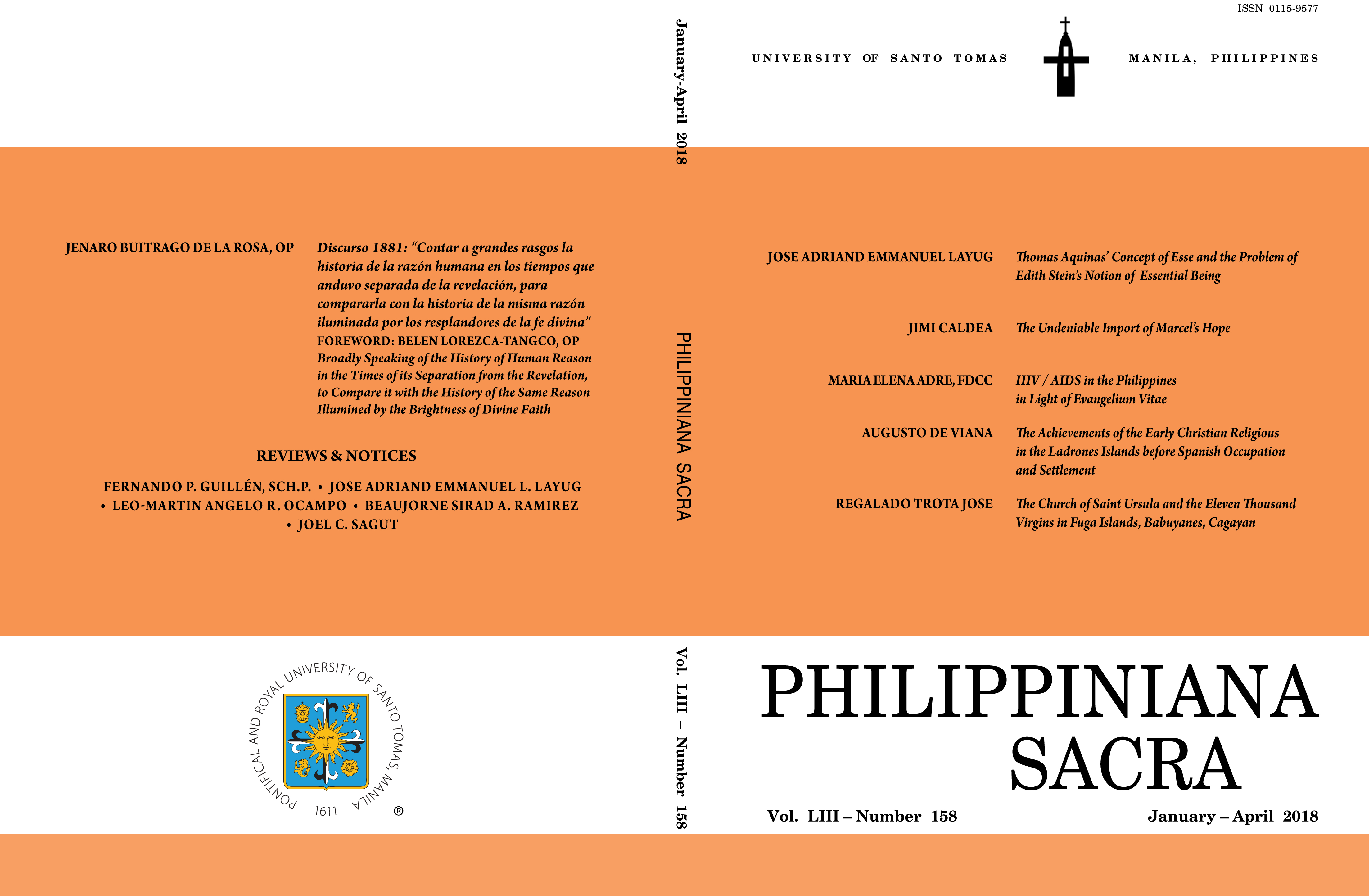-
DOI :
-
https://doi.org/10.55997/ps1001liii158a1
-
Author/s :
-
Jose Adriand Emmanuel Layug /
Philosophy Department, Immaculate Conception Major Seminary, Bulacan, Philippines
Abstract :
St. Edith Stein's notion of essential being, rich as it is, in a sense is problematic. This paper wants to argue this point in the light of St. Thomas Aquinas' understanding of esse. The first part of the paper will present how Stein understood essential being and how its existence is justified. For Stein, essential being must be acknowledged to give a full account of the nature of potency and the unity of intelligible structures otherwise, Stein asserts, one's investigation of being is inadequate. Then the next section of the paper will demonstrate how Stein's essential being is problematic in three ways: a) the primacy of esse; b) efficient causality; and, c) the dynamicity of esse. The paper concludes with a challenge of St. John Paul II in his encyclical Fides et Ratio which this work seeks to respond.
Keywords : Esse, Essence, Ens, Essential Being, Potency, Actuality
-
DOI :
-
https://doi.org/10.55997/ps1002liii158a2
-
Author/s :
-
Jimi Caldea /
Faculty of Humanities and Social Sciences, College of Arts,
Technological Institute of the Philippines, Manila, Philippines
Abstract :
The contemporary man's inclination to transcendence and the ontological is threatened to collapse due to technology, bureaucracy, and the "problematical." With the pervasiveness of both public and private organizations' processes focusing on profit and selfish motives, discounting human and spiritual formation, man's descent to desolation is certain. Hence, "alienation" from himself and the loss of all the wonder, thrill, curiosity, and enthusiasm for all values of life is conceivable. Gabriel Marcel, who experienced the devastation and desolation of the two world wars and, the many excruciating events, such as death and suffering with his family, describes his situation as a "broken world." But because of the profound love and hope that he and his family shared with one another, he was able to keep going in his life. These experiences made him triumphantly confront the relations among death, love, and hope in his life. Accordingly, with man's situation today that are closing his inclination towards transcendence and the ontological, this paper aims to ascertain the import of Marcel's hope. From several Marcellian themes, which are preliminary and interrelated in the discourse of hope, to hope itself, this paper further poses the proposition that hope is undeniable in man's life addressing the many sways for desolation.
Keywords : Marcel, hope, technology, bureaucracy, problematical, man
-
DOI :
-
https://doi.org/10.55997/ps1003liii158a3
-
Author/s :
-
Maria Elena Adre, FdCC /
Canossa Health and Social Center Foundation, Inc., Cavite, Philippines
Abstract :
In 1995, John Paul II wrote Evangelium Vitae (EV) to address the ever-increasing threats to human life and dignity. In this encyclical, he presents the dynamics of a clash of cultures in our modern world: one of death and one of life. This paper presents the worsening HIV/AIDS situation in the Philippines and reads the dynamics described in EV that possibly come into play. It focuses on the elements of current Philippine society and the indigenous culture that generate, sustain, and aggravate the HIV/AIDS situation as well as those that can ameliorate and potentially redeem it. The author posits the use of indigenous cultural elements as a tool to sift or refine existing initiatives and programs addressing the HIV/AIDS situation in order to increase their effectiveness andassuming the value and validity of such a toolthe roles of both the State and Church in shaping a culture that can prevent an epidemic.
Keywords : HIV/AIDS, Philippines, Evangelium Vitae, culture of death, culture of life, indigenous culture
-
DOI :
-
https://doi.org/10.55997/ps1004liii158a4
-
Author/s :
-
Augusto de Viana /
Department of History, University of Santo Tomas, Manila, Philippines
Abstract :
Christians were already present in the Ladrones Islands before a permanent Christian mission was established there in 1668. Now known as the Mariana Islands after the islands were named after Queen Maria Ana of Austria, the Ladrones were discovered by Ferdinand Magellan in 1521 while on his way to find the route to the Spice Islands. The islands were formally colonized by Miguel Lopez de Legazpi in 1565. Since that time, the islands were in the way of the Manila Galleons which plied the route across the Pacific Ocean from Mexico to the Philippines. Despite being on the route of the galleons which brought missionaries to the Philippines, the establishment of a permanent settlement and the founding of a Christian mission to evangelize the natives did not materialize. Economic and practical concerns dictated that the time was not ripe for the establishment of a permanent settlement on the islands. Meanwhile the religious especially those on the way to the Philippines were appealing to the Spanish authorities to expedite the establishment of a permanent mission in the Ladrones. Many of these religious even jumped ship to minister to the natives. Among them were Fray Antonio de los Angeles, Fray Pedro de Alfaro, Fray Juan Pobre, and Fray Pedro Talavera. These religious stayed among the natives and eventually brought to the Spaniards important information about the land and the way of life of the natives of the Ladrones. It would take 66 years later before a permanent mission would be established in the islands which will be named as the Mariana Islands. Through the use of primary and translated sources, we can see the efforts of the early religious to bring Christianity and their views about the inhabitants and their life and customs in the region they considered inhabited by barbarians but also see themselves as workers in God's vineyard.
Keywords : mission, missionaries, settlement, missionary work, galleons



